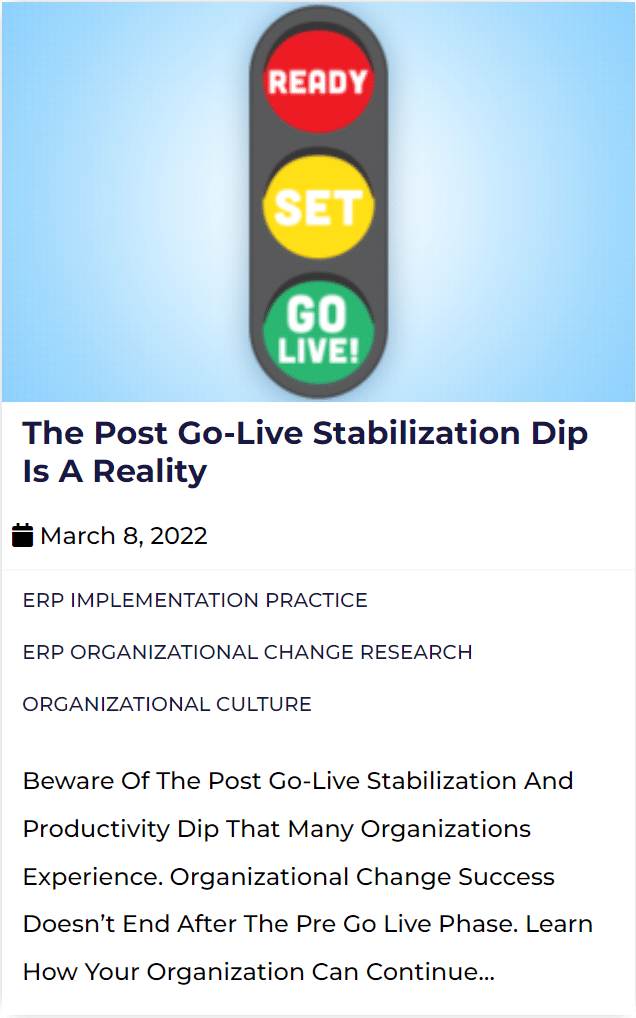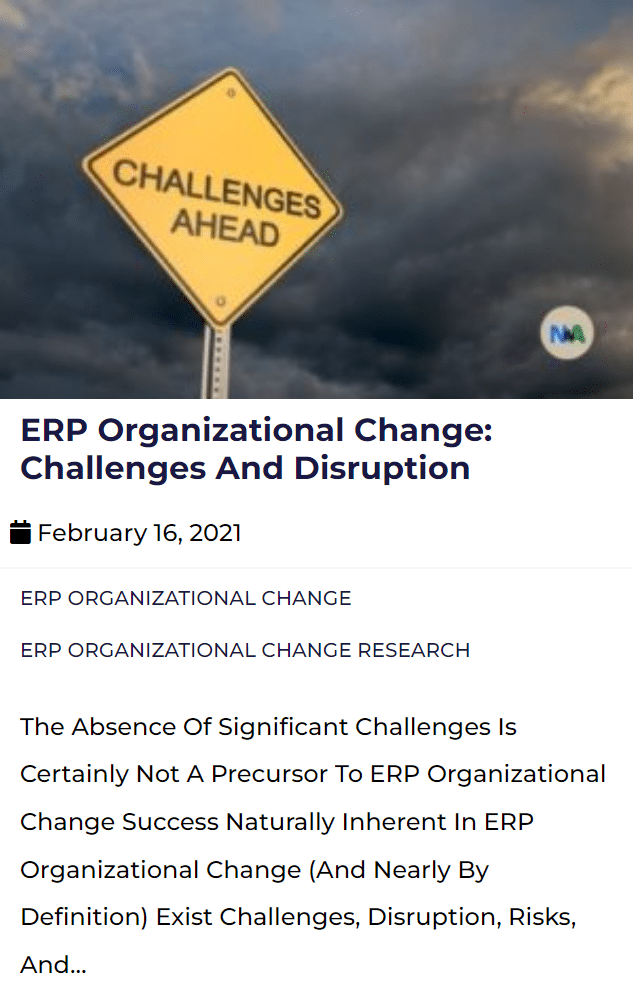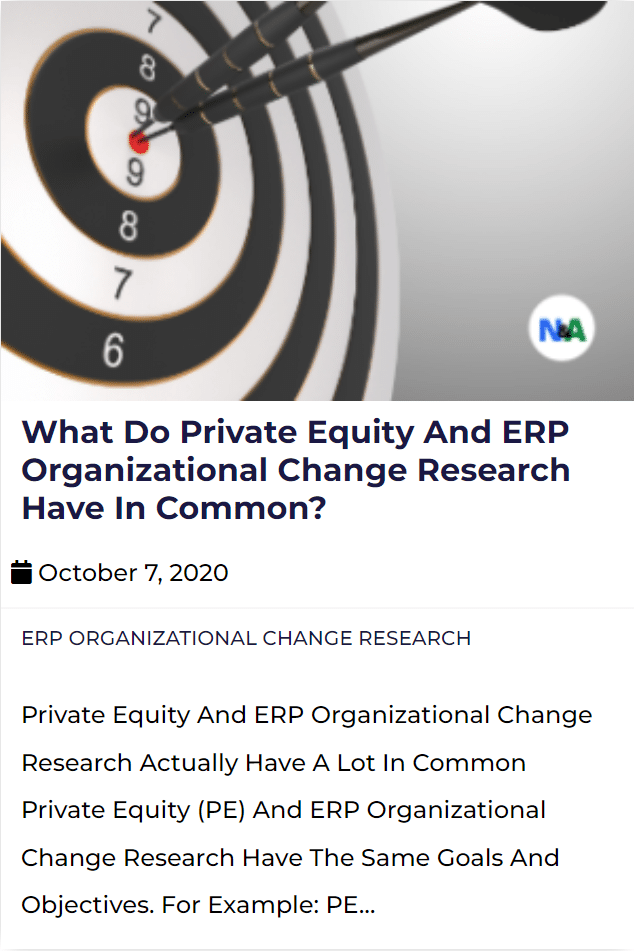When it comes to ERP organizational change research, organizations, and ERP practitioners, should care about what research is telling us.
ERP and organizational change researchers have a passion to bring value to practitioners that are based on sound research and principle. The field and practice of ERP organizational change would benefit from the reflection and application of this insightful work. When it comes to ERP organizational change research, if you are an organization or an ERP practitioner, you should care about what this great current and past research are telling us.
Keep reading to understand why organizations and ERP practitioners should care about ERP organizational Change research.
What is ERP Organizational Change?
Sometimes remaining competitive and healthy requires significant organizational change. And one of those change agents is Enterprise Resource Planning, or ERP, systems that act as a tool to drive improvements and to create or maintain a competitive advantage. ERP organizational change is the act of leveraging ERP systems in an effort to realize improved business outcomes.
In order to fully realize the benefits and value that ERP systems have to offer, however, it often requires the right ERP solution, significant organizational resources, and tremendous effort and time. The process of aligning people, processes, and technology in an effective and efficient way in which to fully realize ERP success and assimilation is called ERP organizational change. However, ERP organizational change has inherent and potentially significant business challenges and risks.
What is ERP Organizational Change Research?
ERP organizational change is often a tremendous organizational effort. ERP organizational change is often a time of high stress, significant stakeholder frustrations, numerous challenges, inherent risks, business interruptions, and even failure. But why is this the case? Does it have to be this way? How can we, as practitioners, positively impact and improve ERP organizational change? These are precisely the questions that researchers in the field of ERP organizational change seek to address. Being able to answer these questions and then applying the research insight will allow practitioners to bring the greatest value to organizations and contribute to the ERP organizational change field.
ERP assimilation challenges and failures are a significant problem directly related to many complex and dynamic influences.
ERP organizational change research considers all aspects of ERP organizational change influences including organizational culture, process, and technology-related factors.
ERP organizational change research studies “success models” and “success factors” in order to offer up possible new perspectives and insight in which to continue to improve the value of ERP, understand how to better utilize ERP, and to better understand how to reduce the challenges and risks associated with large scale ERP implementations.

ERP organizational change research seeks to make a tactical difference in the success of ERP organizational change.
What is ERP Organizational Change Research Telling Us?
The general review of literature and research suggests that understanding and having an awareness of this work and the success factors is an important organizational process. Al-Mashari (2003) described the need for an urgent research agenda that addresses the issues and challenges inherent in ERP adoption. The ERP organizational change literature presents a common theme in which research suggests that organizations that become aware of, implement, and put the appropriate emphasis on the vast array of critical success factors will be better prepared and positioned with the organizational skills needed to increase the likelihood of ERP assimilation and meeting the desired organizational goals (Sawah, Tharwat, & Ramsy, 2013; Moon, 2007; Jafari, Osman, Yusuf, & Tang, 2006). Research notes that there is a lack of routine and quality reflection in practice (Ferry & Ross-Gordon, 1998; Rodgers, 2002) ERP research is ongoing today simply because the need for this research continues and the need for this research is actually driven by demand. The evolution of ERP research continues to look at the problem from many different fields of study, models, and perspectives (Basoglu, Daim, & Kerimoglu 2007).
The collective benefits, knowledge, and awareness of this work could lead to improved organizational ERP performance and success. Scholars and practitioners continue the search to find common denominators in considering all possible influences upon ERP organizational change success.
Why Should We Care about ERP Organizational Change Research?
Because ERP organizational change research seeks to do one primary and fundamental thing: make a tactical difference in the success of your ERP organizational change effort.
Successful ERP assimilation matters because the evidence demonstrates that ERP failure is extremely costly to U.S. organizations (Wailgum, 2009; Osterlind, 2000; Shao, Feng, & Hu, 2017; Jyh-Fu & Nicolas, 2013; Ike & Madsen, 2005). The risk to the organization’s ERP assimilation goal if success is not achieved could lead to a loss in production, a decrease of product quality, loss of customers, loss of sales, and/or significant waste in resources, time, money, and effort. And, worst yet, plant closure, bankruptcy (Scott, 1999) and lawsuits (Grossman, 2004). All of these circumstances are documented in literature, case studies, and articles with evidence demonstrating that ERP failure is extremely costly to U.S. organizations (Grossman & Walsh, 2004).
ERP implementations are abandoned altogether as well as incur significant time and cost overruns incurring millions of dollars in lost investment (Basoglu, Daim, & Kerimoglu, 2007). It is not only the costs of an ERP failure, but it’s also the loss of the ROI and benefits that a successful ERP can bring to an organization.
The Goal of ERP Organizational Change Research
Much great work exists in the field of ERP organizational change specifically (and organizational change in general) in which the goal is to provide additional objective data and insight that is founded in principle. This additional insight may be helpful to organizations in meeting the goal of successful ERP assimilation via improved ERP organizational change performance. Even though many of the challenges are known, failure rates are not improving and ERP implementations remain problematic (Scott, 2018). The primary goal and value of ERP organizational change research is research-based ERP practice.
Listen & Learn
Enterprise Resource Planning (ERP) organizational change research has a primary goal of solving the real, not the perceived, issues to assuring organizational change success. We invite you to listen to our expert guests as we dive into all things research related to ERP Organizational Change on “The ERP Organizational Change Journal” Podcast. Easily find your way to all episodes on this topic by selecting the ERP Organizational Change Research tab!




